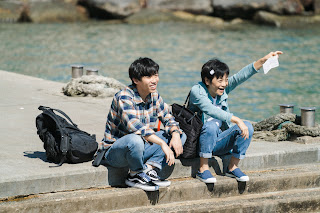The 2014 downing of Malaysia Airlines Flight 17 (MH17) underpins Maryna Er Gorbach's grimly impressive Klondike, an unflinching portrayal of the Donbass conflict that may be a bit strong for some stomachs. While the war in Donbass may have officially ended in February 2022, it was immediately supplanted by Russia's full-scale invasion of Ukraine. Er Gorbach's film, then, occupies an unusual space in that it shows a conflict from the nominal past, yet we all know that the situation it depicts is one that is both escalating and ongoing. Perhaps the point that Klondike is making is that the time in which it is set is largely indistinguishable from the present day; without the reference point that is the MH17 tragedy, the Ukraine of Klondike could easily pass for the 2023 incarnation of the country. At a moment in which it seems as if the situation in Ukraine is slipping down the headlines, Klondike feels like a very timely film.
Klondike centres on the pregnant Irka (Oksana Cherkashyna), whose home is hit by a stray mortar on the same day when MH17 is downed. Irka and her husband Tolik (the late Sergey Shadrin) live in a small village near the Russian border, and Tolik appears to have pro-Russian sympathies. While Tolik is very keen for the couple to flee the area, Irka refuses to leave, even though much of the house's living room is now exposed to the elements. The debris from the wreckage of MH17 spreads as far as Irka and Tolik's property, but even this doesn't give Irka the urge to abandon her home. As anti-Ukrainian separatists tighten their grip on the region, Irka's fiercely pro-Ukrainian brother Yaryk (Oleg Shcherbina) arrives to check on his sister and proceeds to clash with Tolik, although the two bickering men do have a go at repairing the broken wall.
In the days following the shooting down of MH17, a Dutch couple arrive in Ukraine with the hope that their daughter somehow survived the crash; listening to them as they go through the denial stage of grief is a deeply upsetting experience. The presence of these reluctant visitors has an impact on Irka and Tolik, who are tasked with driving the couple to and from the crash site; as they deliver the Dutch couple to a pro-Russian checkpoint, the foreigners are allowed through, but Tolik and Irka are aggressively turned back. As their chance of escaping the village now appears to have passed, things look very bleak for the parents-to-be as they return to their home; unfortunately, this proves to be a bad move, as a brutal band of Russian separatists (at least one of whom speaks Chechen) soon descend on the property. There is also the question of what happened to Yaryk, who abruptly disappeared following his heated argument with Tolik.
Perhaps the most controversial aspect of Klondike is the use of real footage of anti-Ukrainian separatists looting the MH17 wreckage, and it's certainly a bold move by Maryna Er Gorbach to include such material. As Three Colours: Red proved, weaving a real-life tragedy into a work of fiction is always a risky business, especially when that catastrophe is one as recent and raw as the MH17 crash, in which nearly 300 people—more than two-thirds of whom were Dutch—lost their lives. Yet despite this considerable challenge, Er Gorbach manages to place the MH17 case in a milieu that is neither inappropriate nor sensationalist. This is a sober, measured piece of filmmaking, with the jittery handheld camerawork so typical of modern-day war movies eschewed in favour of immaculately composed shots in which the camera is always mounted firmly on its tripod. Should you make it to the end of the film—and its last reel is especially gruelling—you will be rewarded with the faintest flicker of hope. Klondike is a difficult watch, but also a very necessary one.
Darren Arnold
Images: ArtHood Entertainment









